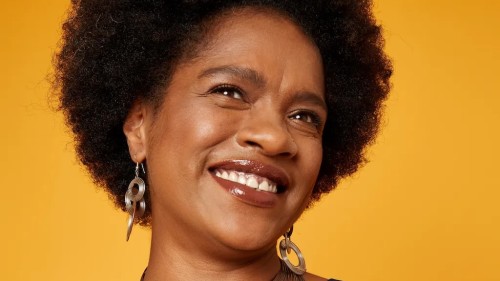re:publica 24
27-29th May 2024
STATION Berlin

It is now impossible to imagine anti-racist work without the internet and digitalisation – groups connect and organise not only on the streets, but also online; activists record protests and post them on Instagram or TikTok. At re:publica 24, academic and artist Natasha A. Kelly will talk about how important the digital revolution was – and still is – for Black communities.
Technology can not only oppress, but also empower: In the present day, the importance of digitalisation for Black people is particularly evident in #BlackLivesMatter – social media has been a central part of the strategy from the very beginning. Since mid-2013, the hashtag has been used repeatedly to criticise racist conditions: The more it spread in the digital space, the more supporters the associated social movement found.
Technologies such as Machine Learning are currently creating new injustices and threats – keyword "racial bias". What will happen next? Natasha takes us on a journey between Afrofuturism, which imagines a future in which Black people are free and no longer oppressed; and digital activism, such as that of the international collective "Black Speculative Arts Movement" (BSAM), which she co-founded – a global community of Black intellectuals and artists that seek to present, promote, and support human centred speculative imagination to catalyse streams of new thought that envision an inclusive future society.
Natasha is a visiting professor of cultural studies in the Studium Generale programme at Berlin University of the Arts. She is a communication scientist and sociologist, author and editor, curator and multimedia artist specialising in Black German history, Black feminism and Afrofuturism. Natasha has taught and researched at numerous national and international universities and has been appointed Max Kade Visiting Professor of German Studies at the University of Rhodes Island (USA) and Visiting Professor of Media Studies at the University of Tübingen. Her artistic work has been shown at the Berlin Biennale, the German Historical Museum and the Maxim Gorki Theatre in Berlin, among others. As Chairwoman of the Board of the non-profit organisation Black German Arts and Culture e.V., she is the artistic and scientific director of the first Institute for Black German Arts, Culture and Sciences in Germany. She is also co-director of the pan-European Black European Academic Network (BEAN).
As the author and editor of several books, she is constantly developing her ideas and calling for not only social but also intersectional justice. In 2019, she released "Schwarzer Feminismus" (Black Feminism), the first basic Black feminist texts in German translation. In 2021, she published the non-fiction book "Rassismus. Strukturelle Probleme brauchen strukturelle Lösungen!” (Racism. Structural problems need structural solutions!) and in 2023, "Schwarz. Deutsch. Weiblich. Warum Feminismus mehr als Geschlechtergerechtigkeit fordern muss" (Black. German. Womxn. Why feminism must demand more than gender equality). The Afrofuturist short story "Juliana" has been available since February 2024.
At #rp24, we look forward to Natasha's inspiring insights into the digital revolution from an Afrocentric perspective!
#WhoCares: An interview with Natasha A. Kelly.
The Motto of re:publica 24 is „Who Cares?“. Whom or what are you currently caring about?
Over the last few decades, I have done a lot of anti-racist and anti-sexist educational work for the whole society. It was gruelling and tiring at times. For some years now, I have shifted my focus and endeavoured to take care of myself, my nuclear family and my community – true to the motto "self-care and empowerment".
What do we care about too little as a society?
Our society is still struggling to embrace change. There is a will, but people are not entirely ready to let go of old traditions and conventions. I think that many individuals and institutions have already realised that there needs to be social change, but they often lack the courage and, in most cases, the know-how.
Is there a person, movement or institution that inspires you in their care for a particular issue?
I am strongly influenced and inspired by my political predecessors such as the Black German poet May Ayim, the Black German historian Katharina Oguntoye and also the Black German literary scholar Marion Kraft. Through their Black feminist, anti-racist and intersectional work that they have done in and since the 1980s and 1990s, I have been able to consolidate my own Black German identity, continue to trace Black German history, expand my knowledge and pass it on to future generations.